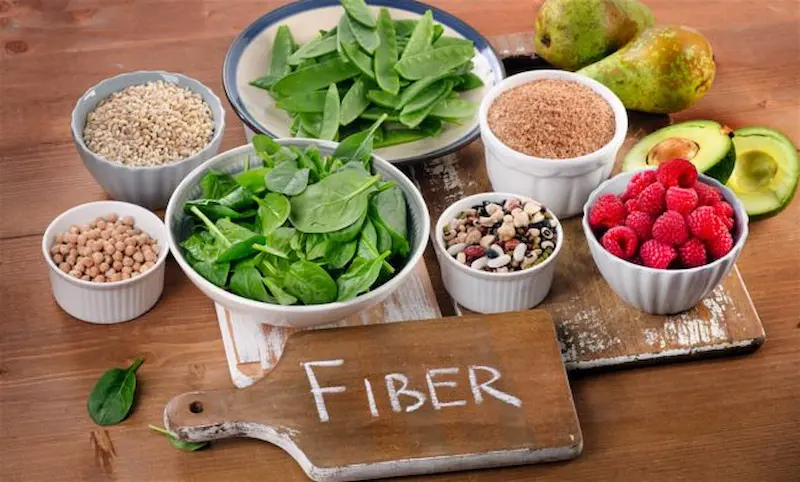When it comes to building a healthy lifestyle, most people pay attention to protein, vitamins, and minerals. But there’s one essential nutrient that doesn’t always get the spotlight it deserves—fiber. You’ve probably heard that fiber is “good for digestion,” but the truth is, its role goes far beyond that.
Suppose you’ve been wondering why fiber is important in diet. In that case, the answer is that it supports your digestion, keeps you feeling full, balances blood sugar, improves heart health, feeds your gut bacteria, and even protects against serious diseases. In short, fiber is a powerhouse nutrient that your body needs every single day.
Let’s take a closer look at what fiber is, how it works in your body, and the many reasons why it’s so important.
What Exactly Is Fiber?

Fiber is a type of carbohydrate that the body can’t fully digest. Unlike other carbs that break down into sugars for energy, fiber passes through your stomach and intestines mostly intact. This unique feature is what makes fiber so beneficial—it helps regulate how food moves through your digestive system.
There are two main types of fiber, and both are equally important:
- Soluble fiber
- Dissolves in water and forms a gel-like texture in the gut.
- Slows digestion, which helps control blood sugar and lower cholesterol.
- Found in foods like oats, beans, apples, and flaxseeds.
- Dissolves in water and forms a gel-like texture in the gut.
- Insoluble fiber
- Does not dissolve in water.
- Adds bulk to stool, helping prevent constipation and keeping your digestive system moving.
- Found in foods like whole grains, nuts, and vegetables.
- Does not dissolve in water.
A healthy diet should include both soluble and insoluble fiber for maximum benefits.
You may also like to read these posts:
How to Make Healthy Pasta | Nutritious & Tasty Guide
Easy No-Cook Healthy Lunch Ideas | Quick & Nutritious
Why Homemade Recipes Are Healthier | Cook Smart & Eat Well
Best One-Pot Healthy Dinner Meals | Quick & Nutritious
Why Fiber Is Important in Diet
Now let’s break down the specific reasons why fiber matters so much:
1. Promotes Healthy Digestion
One of the most obvious benefits of fiber is its role in digestion. Insoluble fiber acts like a natural broom, sweeping waste through your intestines and making bowel movements regular. This helps prevent constipation, bloating, and discomfort.
Soluble fiber, on the other hand, creates a soft gel in the stomach, which slows down digestion and helps your body absorb nutrients better. Together, they make your digestive system strong and efficient.
2. Supports Blood Sugar Control
For anyone managing diabetes or prediabetes, fiber is a must-have nutrient. Soluble fiber slows the breakdown of sugar and starches, preventing sudden spikes in blood sugar after meals. Instead of a sugar rush followed by a crash, fiber helps you maintain steady energy throughout the day.
3. Helps Manage Weight Naturally
If you’re trying to lose or maintain weight, fiber should be your best friend. High-fiber foods are filling but usually lower in calories. Because they take longer to digest, they keep you satisfied for longer periods, reducing the chances of overeating or snacking on unhealthy foods.
For example, eating a bowl of oatmeal with fruit keeps you fuller longer than a sugary cereal—even though both may have the same number of calories.
4. Lowers Cholesterol and Protects Heart Health
Soluble fiber binds with cholesterol particles in your digestive tract and helps remove them from your body. This lowers “bad” LDL cholesterol and reduces the risk of heart disease. Studies have shown that people who eat high-fiber diets have a significantly lower risk of high blood pressure, stroke, and heart-related issues.
5. Feeds Your Gut Microbiome
Your gut is home to trillions of bacteria—some good, some bad. The good bacteria play a vital role in digestion, immunity, and even mental health. Fiber acts as a prebiotic, meaning it provides food for these healthy bacteria.
When your gut bacteria feed on fiber, they produce short-chain fatty acids, which reduce inflammation, boost immune function, and may even lower the risk of colon cancer.
6. Reduces the Risk of Chronic Diseases
A high-fiber diet is linked to a lower risk of several serious health problems:
- Type 2 diabetes – fiber slows sugar absorption.
- Heart disease – fiber lowers cholesterol and blood pressure.
- Colon cancer – fiber helps keep the digestive tract clean and healthy.
In fact, research shows that people who eat more fiber live longer, healthier lives.
7. Provides Steady Energy
Because fiber slows the digestion of carbs, it helps release energy more gradually instead of in quick bursts. This prevents fatigue, improves focus, and keeps you feeling energetic throughout the day. That’s why fiber is especially important for busy professionals, students, and athletes.
How Much Fiber Do You Really Need?

The recommended daily intake of fiber is:
- Women: 25 grams per day
- Men: 38 grams per day
Unfortunately, most people only get about 15 grams daily, which is far below what the body actually needs. That’s why consciously adding more fiber-rich foods to your meals can make a huge difference in your overall health.
Best High-Fiber Foods to Add to Your Diet
Here’s a list of nutrient-packed foods that are excellent sources of fiber:
- Fruits: Apples, pears, bananas, berries, oranges
- Vegetables: Carrots, broccoli, spinach, Brussels sprouts, sweet potatoes
- Whole grains: Oats, quinoa, brown rice, whole wheat pasta, barley
- Legumes: Beans, lentils, chickpeas, peas
- Nuts & seeds: Almonds, chia seeds, flaxseeds, pumpkin seeds
Tips to Increase Fiber Intake
- Start your day with oatmeal or whole-grain cereal.
- Add beans or lentils to soups, salads, or main dishes.
- Snack on fruit, nuts, or raw veggies instead of chips or candy.
- Swap white bread, rice, and pasta for whole-grain versions.
- Sprinkle chia or flaxseeds into smoothies or yogurt.
Pro Tip: Increase fiber gradually and drink plenty of water. Adding too much fiber too quickly may cause bloating or gas, but your body will adjust with time.
Final Thoughts
So, why fiber is important in diet comes down to this: it’s not just about avoiding constipation—it’s about supporting your whole body. Fiber improves digestion, balances blood sugar, lowers cholesterol, helps with weight management, and protects against chronic diseases. It even strengthens your gut health, which impacts everything from immunity to mood.
By simply adding more whole, fiber-rich foods to your meals, you’re investing in long-term health, energy, and overall well-being.
FAQs
1. Why fiber is important in diet?
Fiber is important in diet because it supports digestion, controls blood sugar, lowers cholesterol, helps with weight management, and reduces disease risks.
2. What happens if you don’t eat enough fiber?
Not getting enough fiber can lead to constipation, unstable blood sugar, higher cholesterol levels, weight gain, and increased risk of heart disease and diabetes.
3. How much fiber do I need daily?
Women need around 25 grams per day, while men should aim for 38 grams per day. Most people only consume about half of this recommended amount.
4. What foods are highest in fiber?
Fruits, vegetables, whole grains, beans, lentils, nuts, and seeds are excellent sources of fiber. Oats, apples, broccoli, and chia seeds are especially high.
5. Can I take fiber supplements instead of eating fiber-rich foods?
Fiber supplements can help fill small gaps, but whole foods are the best source since they provide vitamins, minerals, and other nutrients along





